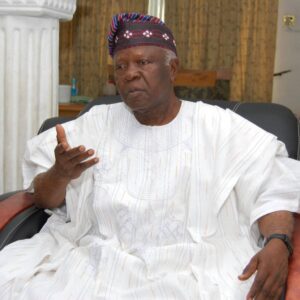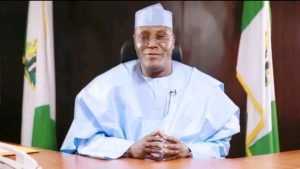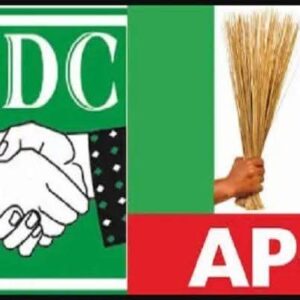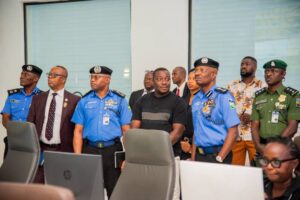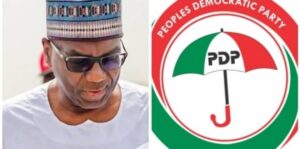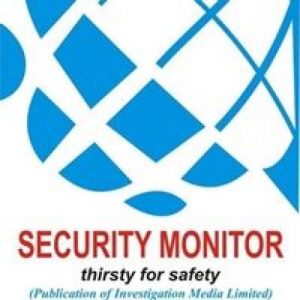EXPOSED: Saraki’s Shonga Farm Project in Kwara Is Fraud
In 2004, during the administration of Dr Bukola Saraki, 13 displaced white farmers from Zimbabwe were brought to Kwara State to do farming by the Kwara State Government.
At the time, the farmers were simply referred to as Zimbabwe Farmers.
However, since their arrival in 2004, their farming project has been involved in crisis of ownership due to the involvement of the Kwara State Government.
While many Kwarans believe that the project was developed and owned by the state, the former administrations were giving contradictory explanations, leading to more questions than answers.
To unearth the truth behind the project once and for all, Governor Abdulrahman Abdulrazaq set up a committee to look into the project and many others.
In July 2019, the Kwara State Governor, Abdulrahman Abdulrazaq constituted a committee, led by Sen Ajadi Makanjuola to review sales and disposal of government properties between 1999 till date, and one of the properties reviewed is the Zimbabwe Farmers project, now known as Shonga Farm.
How was shonga farm created?
Senator Ajadi led committee found that, at the inception of the project in 2004, 17000 hectares of land were forcefully taken over by Bukola Saraki led goverment from about 33 villages of Shonga District in Edu Local Govt area of Kwara State.
When land was taken from those 33 communities, the owners and people of Shonga protested and resisted the forceful takeover of their ancestral land, but they were suppressed, brutally attacked and unlawfully arrested and prosecuted.
Additionally, apart from the forceful takeover of Shonga land, it was discovered that a lot of money was also expended by Kwara State government on the project and till date, the exact amount cannot be ascertained because all files related to the project have been carted away by officials of the past administration.
It is important to note that, the 17000 hectares of land forcefully taken from Shonga people were distributed to the 13 Zimbabwe farmers by government and they all registered the farm in their individual names as owners.
Meanwhile, all the 13 farmers did not come to Kwara with any money or investment. The government of Kwara under the leadership of Dr Bukola Saraki took care of all their bills, including building befitting accommodation for them.
The Kwara State government also gave them take off grant in foreign currency, as well as sunk boreholes, provide steady electricity, communication gadgets and others.
We should also add that, in addition to the above cost incurred, government also guaranteed the farmers loan facilities with Nigeria Agricultural Bank and Rural Development Bank to the tune of N650million.
Furthermore, Bukola Saraki led government also led the unknown farmers without any collateral to procure several other loans from 6 other Banks, including Central Bank of Nigeria (CBN) and till date, the amount taken from these other banks is yet to be ascertained.
However, when the farmers could not pay back the loans they took, it was deducted at source, from the kwara State allocation.
This was so because, Kwara State government had earlier issued an irrevocable standing payment order to the office of Accountant General of the federation as guarantor for the loans in event of a default. The amount deducted from Kwara State allocation was over N1billion.
Based on the above facts, it was clear that the Kwara state government is responsible for the establishment of the project and being solely responsible for its funding.
However, in 2007, from Zimbabwe farmers, the project was turned into what is now known as Shonga Farm. The company, Shonga Farm Limited was incorporated with share structure.
Surprisingly, instead of Kwara State government which has been the sole financier of the project to be owner of the company, several banks were listed as shareholders as follows, Unity Bank (15%), Intercontinental (15%), GTB (15%), Bank PHB (15%), FinBank (15%) and Kwara State (25%).
From this shareholding arrangement, Kwara State is said to have only 25% of the company, with the remaining 75% being owned by banks.
Another major observation was that, out of the 13 farms earlier established in 2004 by the 13 Zimbabwe Farmers, 11 have been sold to other strangers not captured in the shareholding arrangement and those 11 farms were not part of those incorporated into Shonga Farm in 2007.
So, what we have as Shonga Farm today is just 2 out of 13 farms established with Kwara State money by the Zimbabwe farmers in 2004. The remaining 11 have been sold to others before Shonga Farm was incorporated and the entire worth of Kwara share in this enterprise, is said to be N420million.
It was also found that, the loans taken from the listed banks were also converted to shares, reflecting the 15% shares allocated to the 5 banks earlier mentioned.
To make matter worse, the exact amount spent by the Kwara State govt cannot be ascertained and all documents relating to this farm has been carted away from the various ministries. The amount borrowed from the shareholding banks before they were converted as shareholders also can not be ascertained.
Additionally, even though Kwara State is said to own 25% shares as major shareholder of the company, no Kwaran is part of directors of Shonga Farm. All those managing the farm are cronies of the former governor from outside the state.
From the above, it is clear that there is an urgent need to fish out all documents relating to Shonga Farm that has been carted away by men of the previous govt. This would go a long way in unravelling the mystery behind the company’s dirty dealings.
It was recommended that the State Auditor General should be mandated and empowered by government to carry out forensic audit of the company, in addition to overhauling its activities and all properties bought by Kwara State government but still in possession of erstwhile workers of the company should be retrieved.
Finally, should any criminality be discovered after the audit has been done, all those involved should be dragged to anti-graft agencies for prosecution.
Kwara Must Change
[11/11, 11:39 AM] Abdulrazaq Hamzat: *Governor Abdulrahman Abdulrazaq and the 2023 debate*
By Abdulrazaq Hamzat
Who told you that the Kwara State Governor, Abdulrahman Abdulrazaq would not become Nigeria’s president in 2023?
I do not mean becoming the governor for second term in Kwara, but becoming the president of Nigeria. Who told you this cannot happen?
This is a question that has generated so much heat online since it was asked by Kwara Must Change few days ago.
But in truth, who really told you that Governor Abdulrahman Abdulrazaq cannot become Nigeria’s president in 2023? After all, nobody knew he would become Kwara State governor in 2015.
As strange as this question seems, nobody can say, very authoritatively that this is what would happen in 2023. We don’t even know, if we will make it to December 2019. Everybody reacting are just doing so on the bases of feelings, political standing and some kind of sentiments.
In some of the responses generated online, I observed that some people find the question very strange and annoying, wondering why anyone would be talking about 2023 presidency, when the governor is yet to spend 10% of the duration of his current mandate as governor.
It is even more worrisome because, the developmental strides of the governor is yet to fully manifest to warrant any critical assessment of performance. This is exactly how I often feel, when I see people talking about 2023 in 2019.
A while ago, a recorded mobile conversation between an APC chieftain and a group circulated online, in which the representative of the group, while advancing his position on the appointment of governor Abdulrahman, made reference to 2023 and their disinterest in returning the permanently defeated former Kwara overlord, Bukola Saraki, as if it is time for another election.
But beyond that example, a walk into any political discussion or gathering in Kwara State today would hardly escape dissection of 2023 election, particularly as it relates to governor Abdulrahman second term.
Even within the various caucuses in the ruling APC, as seen online in various write-ups and press releases by different groups, as well as on radio programmes, the 2023 election has become a talking point to react to every action of the governor, as if there is anyone in Nigeria who doesn’t know that election would always come every 4 years.
For example, when Governor Abdulrahman first forwarded names of 4 women to the State House of Assembly as commissioners, the reaction of those who felt uncomfortable with the women nomination is that, he may not get second term with such nomination, forgetting that he is simply fulfilling one of his many campaign promises. When they learnt that the governor has nominated many youths, including a 26-year-old as commissioners, those that are not happy with the nomination on political bases said he may not get second term because of such nomination, not minding the fact that, it is another campaign promise fulfilled.
When the final list of commissioners was made with women having 56% of the entire list, those who felt uncomfortable said 2023 is not far away, arguing that the women don’t have political value.
When the governor refused to share public resources during sallah to the selected few, saying that public wealth should be for development, some say he may not get second term and I ask, who told you he would not become Nigeria’s President in 2023?
I mean, for God’s sake, we are in 2019 when governance should be our major priority not politics. But some people are already using 2023 as a talking point to advance some interests, probably to coerce the governor into doing their biddings.
So, if we have all decided to be talking about 2023 in 2019, at a time that the governor is yet to spend 10% of his 4years mandate. If we can sit down in one corner of our rooms and deciding who gets second term in 2023 and who doesn’t, isn’t that a disservice to the people and even to our own self? If you ask me, it is unhealthy, to throw away governance for politics.
Let me conclude by saying that, this is a time that governance should dominate our public discourse. We should tune down our political narrative in the interest of all. The governor should be held accountable to his campaign promises, not be distracted with political narrative of 2023.

